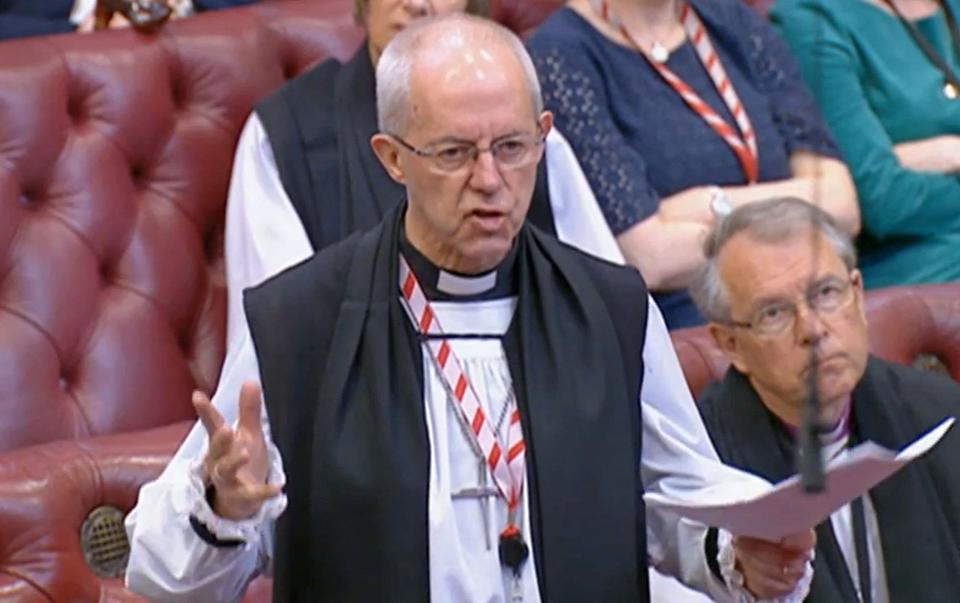The Bishops are wrong: there’s nothing immoral about controlling our borders

Earlier in May, the Archbishop of Canterbury described the Government’s illegal migration bill as “morally unacceptable”. This week, he advanced his opposition to the bill’s proposal to remove illegal cross-Channel migrants to Rwanda, by tabling a pair of amendments. Yet the reasons that he and his episcopal colleagues gave for their moral condemnation earlier this month were no more compelling than the ones they gave last year.
From April 2022, when the Government first announced a removal agreement with Rwanda, the bishops offered a variety of criticisms in sermons, the press, and the House of Lords. They objected to the removal of vulnerable people fleeing “war, famine, and oppression”, to a policy of deterrence and to the subcontracting out of national responsibilities. And they lamented the lack of safe and legal routes for claiming asylum.
In December, three Oxford professors – the lawyers Richard Ekins and John Finnis, and I as a moral theologian – rebutted their arguments in a Policy Exchange paper, “From the Channel to Rwanda”. We pointed out, first, that the migrants crossing the Channel are not directly fleeing war in places such as Eritrea, Syria or Afghanistan. They are leaving France – peaceful and liberal.
We denied that the Government’s policy would amount to careless rejection. By making it clear that those attempting illegal entry will not be granted asylum here, it aims to remove the incentive for the dangerous trafficking of people in vulnerable boats across the Channel, thereby promising to save lives. And by sending the illegal migrants to a third country not embroiled in war, not suffering famine and, arguably, observing the rule of law, it offers them the prospect – if deemed deserving of asylum – of being able to rebuild their lives. Such a policy may disappoint asylum-seekers by denying them permanent residence in the UK, but it is not lacking in care.
Regarding deterrence, we observed that it is common to uphold law by making the consequences of transgression unattractive. Cross-Channel migration in small boats is illegal. Deterrence is an appropriate response.
As for subcontracting, individuals and states often discharge their responsibilities indirectly, through arrangements with third parties. What matters is that the responsibility is discharged.
Finally, we acknowledged that “safe and legal” routes to asylum are limited and unavailable to some who deserve it. Applications can only be made on UK territory, and – with some exceptions – no non-national can lawfully enter the UK without a visa. But this is so for all countries that attract immigrants – including all EU member-states, the US, Canada, Australia, and New Zealand. The reason is simple: were it possible to apply for asylum from anywhere in the world, applications would quickly become a tidal wave. After all, most of the 1.4 billion citizens of Communist China would have an arguable claim. Yet, even if the Government were to widen legal access – as it has promised to do – that would still not solve the problem of cross-Channel migration. For unless every legal applicant was successful, recourse to illegal means would persist.
It seems that critics have taken notice of December’s paper, and have begun to deploy an almost entirely different set of arguments. These are no more persuasive.
First, they object that it violates the 1951 Refugee Convention, undermining Britain’s reputation for upholding the rule of law and the international system of refugee protection. But it doesn’t. The Convention forbids only the sending back of refugees arriving directly from an unsafe country. The bill proposes to take illegal migrants arriving from safe France and remove them to sufficiently safe Rwanda.
Next, they complain that the bill won’t address the larger problem of mass migration. That is true and the Prime Minister mooted the need for closer cooperation at the recent meeting of the Council of Europe. But why must attempts to tackle an immediate national crisis wait upon the laborious, protracted negotiation of a solution to a long-term, international problem?
Finally, they worry at the lack of support offered to children, pregnant women, and victims of modern slavery. But while they were right to demand that vulnerable people be treated with humanity, humane treatment is not incompatible with detention and removal.
The Illegal Migration Bill intends to solve the intractable problem of cross-Channel human trafficking. The end is just and the means, while severe, are not immoral.
Nigel Biggar is Regius Professor Emeritus of Moral Theology at the University of Oxford

 Yahoo Sports
Yahoo Sports 